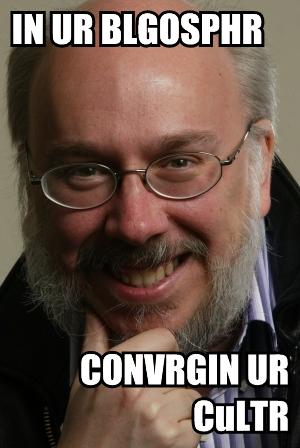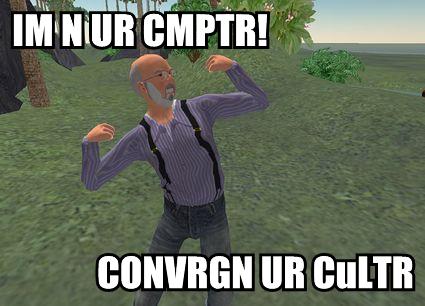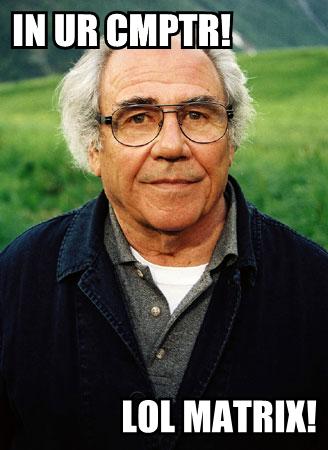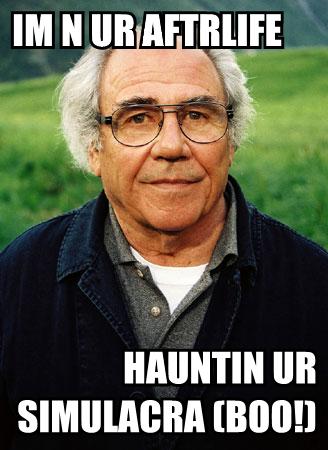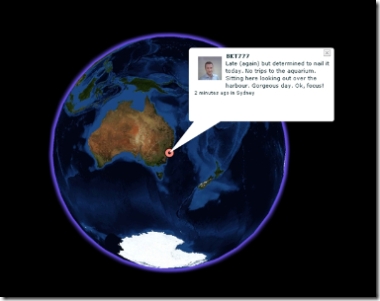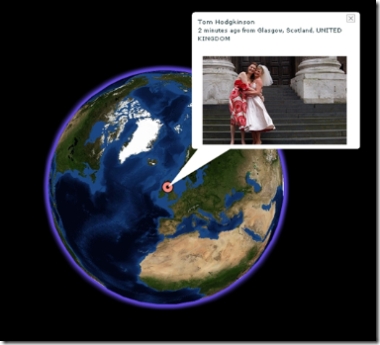Google Gears Into Offline Applications!
 The line between Microsoft and Google just got fuzzier with the release of Google Gears, a humble browser extension that suddenly allows GMail, Google Reader and other previously web-based applications to work offline! The competition for Microsoft’s cash cow, the Office Suite, just got stronger.
The line between Microsoft and Google just got fuzzier with the release of Google Gears, a humble browser extension that suddenly allows GMail, Google Reader and other previously web-based applications to work offline! The competition for Microsoft’s cash cow, the Office Suite, just got stronger.
This little tick marks a radical transition for Google…
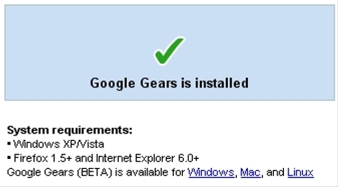
… every one of those brilliant online applications from Google Docs and Spreadsheets to Google Reader just started to mark their way onto your offline desktop. Sure, Google Gears are very in Beta (as opposed to, say, the last 12 months which GMail spent in Beta), but as those kinks are worked out, Microsoft’s competition just got stauncher!
links for 2007-05-31
-
LOL Cats meets The Rocky Horror Picture Show! (Framegrab silliness and laffs ensue!)
LOL Theorists
In a fit of silliness, I find myself using the LOL CATS builder for terrible, terrible, theorist humour …
Where did this insanity come from? I blame Jean (Burgess, not Baudrillard!). (More here.)
Update: Henry Jenkins linked to the LOL Theorist mashups of himself! 🙂
links for 2007-05-29
-
“What do you think of the latest video on YouTube? Wait. Don’t answer that, or at least don’t answer with words. … Really the only authentic response to a YouTube video is another YouTube video — the so-called ‘video response.'”
-
Bursts, chunks and web-publishing! Quote: “If attention span was dead, JK Rowling wouldn’t be selling paperbacks thick enough to choke a pig… ” [Via]
-
3D stereoscopic images of the sun (and other things) from NASA. The 2D images are pretty amazing, too!
-
The Learning Circuits Blog starts a robust and long blog conversation about the pros and cons of Powerpoint in education … lots of useful tips and things to consider in the various links!
-
OJ Simpson mashed with The Simpsons. A really odd mashup.
-
“Social network sites (SNSes) like MySpace, Facebook, and Bebo are ubiquitous and today’s youth are spending a great deal of time using these sites to access public life. How is public life shaped by social technology?” What role do educators play?
Academic Ethics, Privacy and Transparency … all coming soon to YouTube!
Australia’s QUT has been in the grip of a very public controversy recently which dovetails between issues of freedom of speech, academic ethics and the transparency of university processes. The controversy came to light and media attention on 11 April this year when two QUT academics, John Hookham and Gary MacLennan, published an article in The Australian entitled ‘Philistines of relativism at the gates’. In it, Hookham and MacLennan very publicly took issue with the ethics of work being done by PhD candidate, Michael Noonan:
A time comes when you have to say: “Enough!”, when you can no longer put up with the misanthropic and amoral trash produced under the rubric of postmodernist, post-structuralist thought. The last straw, the defining moment, came for us when we attended a recent PhD confirmation at the Queensland University of Technology, where we teach. Candidate Michael Noonan’s thesis title was Laughing at the Disabled: Creating comedy that Confronts, Offends and Entertains. The thesis abstract explained that “Laughing at the Disabled is an exploration of authorship and exploitation in disability comedy, the culmination of which will be the creation and production (for sale) of a six-part comedy series featuring two intellectually disabled personalities. “The show, entitled (Craig and William): Downunder Mystery Tour, will be aimed squarely at the mainstream masses; its aim to confront, offend and entertain.” (Editor’s note: the subjects’ names have been changed to protect their privacy.) Noonan went on to affirm that his thesis was guided by post-structuralist theory, which in our view entails moral relativism. He then showed video clips in which he had set up scenarios placing the intellectually disabled subjects in situations they did not devise and in which they could appear only as inept. Thus, the disabled Craig and William were sent to a pub out west to ask the locals about the mystery of the min-min lights. […]
At the seminar we were told there was a thin line between laughing at and laughing with. There is no such thin line. There is an absolute difference that anyone who has been laughed at knows. We must admit with great reluctance that at the seminar we were alone in our criticism of the project. For us, it was a moment of great shame and a burning testimony to the power of post-structuralist thought to corrupt. It is not our intention here to demolish the work of Noonan, an aspiring young academic and filmmaker. After all, ultimate responsibility for this research rests with the candidate’s supervisory team, which included associate professor Alan McKee, the faculty ethics committee, which apparently gave his project total approval, and the expert panel, which confirmed his candidacy. […]
What we have instead is the reality that cultural studies is in the grip of a powerful movement that we call the radical philistine push. It is this same movement that has seen the collapse of English studies and the consequent production of graduates who have only the scantiest acquaintance with our literary heritage. It is also undermining the moral fabric of the university.
So, what starts with ethical questions about a particular thesis, quickly becomes a much more generic complaint about the corruption of education by poststructuralist and postmodern theory and approaches. I know nothing of the people writing or mentioned in this article, but have to say after reading the piece I wasn’t swayed; my sympathies were more with Michael Noonan than anyone else, because as a PhD candidate I know I would have been almost destroyed by such public denouncing of my work. This, I should add, is not a comment on the quality on the work being or proposed – I know nothing beyond the article above and the surrounding debate, and haven’t seen any of the footage mentioned – but rather a comment on the process and the reasonable expectation that any criticism of a candidate’s work be handled within the university as long as possible. I’m not saying there is never a case for ‘going public’ with dismay about certain research, but from what I’ve read I believe Hookham and MacLennan took that step far too early. More to the point, combining criticism of a specific project with a very generic attack on a particular body of theory and its influence on teaching seems a less than generous way of dealing with the work of a PhD candidate.
The issues raised here also beg serious questions about transparency and universities. There is a lot of talk about the need to transparency of research outcomes since (most) Australian universities are at least partially publicly-funded. I quite agree with that notion. However, I think the idea of the processes of a university being taken public under the rubric of transparency tend to skew what makes it into the public arena. Selectively releasing aspects of a process (such as an ethics review process and confirmation of candidature) around research which clearly relies on careful contextualisation is bound to produce a one-sided picture. Tellingly, when Hookham and MacLennan’s article was republished in Online Opinion, the were comments from a student – using the handle WWSBD – who’d had Noonan (the candidate) as a lecturer, praising his efforts to educate student about people with disability. Moreover, this is the only place I’ve seen Noonan himself comment publicly:
I am at the student at the centre of Hookham and MacLennan’s attacks.
I thank WWSBD for understanding and appreciating my work in its context. I appreciate the words of Anecdote, who understands that a work must be seen and placed in context before it should be attacked. And I am disappointed for bedwin, who has lost all respect for me on the basis of an uninformed and incorrect article.
Much has been assumed about my project, my integrity and my intentions. Very little of it is based on truth. The simple facts are these: the excerpts I showed at my PhD confirmation seminar were presented in the context of exploring and discussing issues of authorship and representation in disability. My project seeks to empower the disabled, to give them a voice through comedy. Each clip was prefaced with my own thoughts about whether or not this had been achieved.
As a sessional staff member at QUT, I can think of nothing more deplorable than attacking a student’s incomplete research in a public forum. Hookham and MacLennan have made no effort to read my PhD confirmation document (it was offered) and they rejected my attempts to meet and discuss their concerns.
To date I have not sought to respond to their attacks in print. But I refuse to be further bullied and vilified before the public, my peers and my students.
However, the story doesn’t end there. Earlier this month The Australian report that Hookham and MacLennan are now facing a disciplinary hearing at QUT for their public comments, with the university arguing that the two unfairly attacked the candidate and his supervisory team. Now, whatever their views, Hookham and MacLennan seem to have a reputation as inspirational teachers themselves, and the news of their censure galvanized some of the QUT student body to defend their actions on the basis of free speech. The student campaign is visible through it’s “Save Our Lecturers” MySpace page. Moreover, over at Martin Hirst’s blog, he has posted ‘Freedom of Speech disabled at QUT’ which points to this documentary which is now available at YouTube:
(Hirst is a friend of Hookham and MacLennan’s, and his post also contains the full text from Hookham and MacLennan’s original article in The Australian, as well as some additional commentary from The Australian and subsequent letters to editor.)
The YouTube documentary clip, by QUT student Adrian Strong, is very compelling; Hookham and MacLennan both come across as intelligent, compassionate teachers and academics who have good cause for concern. My point here is not to judge the debate being documented in this clip – although I imagine it would be extremely compelling for many people. Rather, in the era of participatory culture and digital media, this clip is indicative of a very profound change which can see debates and arguments that once would have remained closed suddenly being open to public viewing and public debate. In such an era, digital literacy is extremely important – the ability to create, edit and share such a clip is a key part of the ability to make a case in the public eye. It’s no surprise that QUT, which has Australia’s most renowned Creative Industries faculty, should be the source of the first such debate in Australia (to my knowledge, at least).
Illustrating my point, I just noticed another posted by the same YouTube user who posted the clip above (and thus, I presume, also be Adrian Strong) which talks in even stronger terms about a perceived campaign of censorship at QUT:
(Again, let me reinforce, I don’t know enough about the other things going on to really judge this debate, but I do know that the perception of censorship certainly doesn’t add to the reputation of any university. However, like the first clip, without any further rebuttal, this clip is likely to be very persuasive to viewers.)
Update: In ‘Dissenting dons out in the cold’, Andrew Fraser reports in The Australian that the saga ended with Hookham and MacLennan both being suspended without pay for 6 months from QUT.
links for 2007-05-28
-
No stupid breaks; Advance the storyline; Don’t cancel the show without an ending; Commit to an end time for the first storyline; Don’t have cliffhangers season to season; Don’t name the show; Don’t screw with the timeslot; Find a new storyline …
-
Dave Winer: “…next step … is the professional media fully embracing the new media, no longer see it as a threat to their continued employment. Seeing amateur public writing, the former audience who is no longer silent…”
-
… Jericho was canceled on short notice recently, leaving … fans scrambling to try to save it. “Scramble” might be the wrong word, because in fact it’s a delightfully well-coordinated effort, complete with daily missions and 14,684 pounds of nuts
-
BBC: “More than a third of UK bloggers risk the sack by posting derogatory or damaging details about their workplace, boss or colleagues, a survey claims.”
-
Rex Sorgatz: “We visited the Zune HQ today. In the entryway was an iPod recycling bin.”
-
Jason Mittell on the Lost Season Finale: “This is a great example of the operational aesthetic, … part of the pleasure and engagement with a program is in examining the gears of the storytelling machinery, not just the story itself.”
-
“… on the one hand, the digitisation of content and provision of information and, on the other, interactivity and opportunities for expression. Some have seen these as in binary opposition. The truth is that they are inexorably merging.”
links for 2007-05-25
-
A YouTubed version of one of Spider Jerusalem’s speeches from Transmetropolitan. (Feels like Trainspotting in a cominc book, on the interweb!) [Via]
-
Hilarious clip showing some of the (glaring) continuity errors in Star Wars!
-
Alex Halavais has some good advice on questions to ask BEFORE you embark on a research degree in Communication (or pretty much any other topic, too!). Perhaps a little negative, but sadly by and large realistic…
-
“Feedburner is in the closing stages of being acquired by Google for around $100 million.” (All your feeds are belong to us!)
links for 2007-05-24
-
Score one for better education: “Google is to ban adverts for essay writing services – following claims that plagiarism is threatening the integrity of university degrees.”
-
The creator of Buffy talks about the horrific “honour killing” of 17-year old Iraqi girl Dua Khalil, which was recorded by a cameraphone and distributed online. Whedon compares this with the mysogynistc trailer upcoming feature film, Captivity.
-
Make your own LOL CATS image with this nifty image generator. Let the procrastination … continue!
-
“The Middle East Times just released an article on the Maledives being the first country to open a virtual embassy in Second Life. “The Maldives thus pips Sweden to the post…”
The 4400 Goes Viral (Marketing)
The 4400 has taken to viral marketing dramatically in order to build the word before the upcoming fourth season of the TV show. According to AdWeek:
To promote the new season of The 4400 on USA Network, Campfire has created a wide-ranging interactive world consisting of 80 videos that run from 30 seconds to five minutes and six Web sites. […] The 4400 follows 4,400 people who are abducted, taken away and then returned to planet Earth. After their return, many of them discover they have superpowers. As the fourth season begins on June 17, the plot follows the development of a drug called Promicin: it gives the users superpowers, if it doesn’t kill them. Three different factions emerge around the drug: pro, anti- and neutral.
On YouTube, for example, one of the show’s stars, Billy Campbell, appears in character as Jordan Collier, advocating Promicin and the decrying the government’s attempts to ban the drug. Here’s Jordan Collier dispatch #3:
Elsewhere on the net, we can find the Promicin Power website, which argues that Promicin is the key to world peace and a sustainable relationship with nature. Here’s one example that looks like it could be have been a United Colours of Bennetton advertisement in a past life:
At the other extreme, there’s also Promicin Terror which sees the drug as the biggest threat to the US since Al Qaeda. Clearly building on the famous ‘Daisy‘ political ad of the 60s (which was recycled in the US debates about the War with Iraq), this is an example of a clip campaigning to ban the drug:
I quite enjoyed the last season of The 4400 and am heartened to see the show’s producers so actively embracing the potential of video-sharing and online word-of-mouth. The clips are a little over-produced, but given the state of a lot of TV advertising today, I’m sure they could easily be mistaken for the ‘real thing’.
Visualising the User-Driven Web
I was just pointed to Flickrvision, and I’m impressed. Flickrvision, and its older sibling, Twittervision, are program mashups by David Troy which combine the visualisation of Google Maps with the user-created data flowing out of Flickr and Twitter. There’s a ‘standard view’ in which individual Tweets or Flickr images are posted on a flat world map, but even more impressive for those visually-minded is the 3D version which inserts Tweets and Flickr photos continually onto a global map (which spins as needs be to show the origin of each post).
An example of Twittervision:
An example of Flickrvision:
Watching these globes spin, each showing a fragment of life around the world, is incredibly engaging. This is the user-driven web at its most visually enticing. I have to say, were I in charge of a Communications Studies or Media Studies department (which I’m not) and I could find a couple of spare monitors and computers (which, in all fairness, departments probably couldn’t), then I’d leave these running 24/7 in the front foyer; the best advertisement for the studying the user-driven web is watching it happen in all its visual glory, right in front of you!
